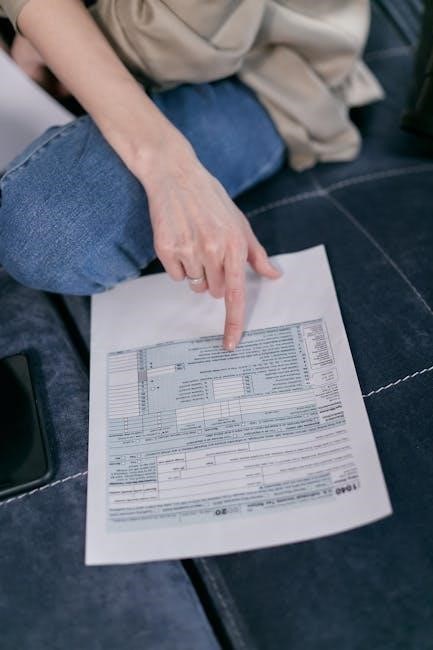form 5472 instructions
Summary
Master Form 5472 filing with our expert guidance. Discover step-by-step instructions and essential compliance tips. Start now!

Form 5472 is an informational return required for foreign-owned U.S. corporations or foreign corporations engaged in a U.S. trade or business. It ensures compliance with IRS regulations by reporting specific transactions and maintaining accurate records. The form is essential for transparency in international business dealings and must be filed annually with the corporation’s income tax return.
1.1 Overview of Form 5472
Form 5472 is an informational return used to report certain transactions between a foreign-owned U.S. corporation or a foreign corporation engaged in a U.S. trade or business and its foreign or domestic related parties. It is a three-page form with nine parts and 52 lines‚ though not all lines may require completion. The form is filed annually with the corporation’s income tax return (Form 1120) and is essential for ensuring compliance with IRS regulations. It provides detailed information about reportable transactions‚ such as rents‚ royalties‚ and service fees‚ and helps maintain transparency in international business dealings.
1.2 Importance of Filing Form 5472
Filing Form 5472 is crucial for maintaining compliance with IRS regulations and avoiding penalties; The form ensures transparency in transactions involving foreign-owned corporations or those engaged in U.S. business activities. Failure to file or late filing can result in significant penalties‚ such as $10‚000 for each violation; The form is essential for reporting transactions under sections 6038A and 6038C‚ which focus on disclosure of dealings with foreign entities. Accurate and timely filing helps prevent legal and financial repercussions while demonstrating adherence to U.S. tax laws. It also aids in maintaining proper records for auditing purposes.

Who Needs to File Form 5472
Foreign-owned U.S. corporations with 25% foreign ownership must file Form 5472. Additionally‚ foreign corporations engaged in a U.S. trade or business are required to comply.
2.1 Foreign-Owned U.S. Corporations
Foreign-owned U.S. corporations with at least 25% foreign ownership are required to file Form 5472. This includes corporations where foreign individuals‚ entities‚ or governments own a significant stake. The form ensures transparency in transactions between the U.S. corporation and its foreign owners or related parties. Accurate reporting is crucial to comply with IRS regulations and avoid penalties. Corporations must submit Form 5472 annually with their income tax return‚ detailing reportable transactions such as rents‚ royalties‚ and interest payments. Proper documentation and adherence to filing deadlines are essential for maintaining compliance.
2.2 Foreign Corporations Engaged in a U.S. Trade or Business
Foreign corporations engaged in a U.S. trade or business must file Form 5472 to report transactions with related parties. This includes rents‚ royalties‚ and interest paid or received. The form ensures compliance with IRS regulations by disclosing these transactions. Failure to file or incorrect reporting can result in penalties. Corporations must submit Form 5472 annually with their U.S. income tax return. Proper documentation and timely filing are essential to avoid compliance issues. This requirement applies to all foreign corporations conducting business in the U.S.‚ ensuring transparency in their financial dealings.
2.3 Disregarded Entities and Their Filing Requirements
Disregarded entities‚ such as single-member LLCs‚ must obtain an EIN to file Form 5472. These entities are treated as separate for reporting purposes and must disclose transactions with foreign owners. Recent IRS updates removed duplicate filing requirements‚ simplifying compliance. Proper documentation and timely submissions are crucial to avoid penalties. Disregarded entities must adhere to specific guidelines‚ ensuring accurate reporting of all relevant financial activities. This ensures transparency and compliance with U.S. tax regulations‚ particularly for foreign-owned businesses operating in the U.S. market. Understanding these requirements is essential for maintaining proper tax standing.

Purpose of Form 5472
Form 5472 ensures transparency by reporting transactions between foreign-owned corporations and related parties‚ facilitating compliance with IRS regulations and maintaining accurate financial disclosures.
3.1 Reporting Transactions with Foreign-Owned Corporations
Form 5472 requires detailed reporting of transactions between foreign-owned corporations and related parties‚ such as rents‚ royalties‚ and sales. These transactions must be accurately disclosed to ensure compliance with IRS regulations. The form mandates reporting of all relevant financial dealings to maintain transparency and prevent tax evasion. It applies to foreign corporations engaged in U.S. business activities‚ ensuring proper documentation of international transactions. This reporting helps the IRS monitor cross-border financial activities and enforce tax laws effectively. Accurate and timely reporting is essential to avoid penalties and ensure adherence to U.S. tax obligations.
3.2 Ensuring Compliance with IRS Regulations
Form 5472 plays a critical role in ensuring compliance with IRS regulations by requiring detailed reporting of transactions with foreign-owned corporations. The form helps track financial dealings‚ ensuring transparency and adherence to tax laws. Recent updates‚ such as the removal of duplicate filing requirements‚ simplify the process while maintaining accountability. Accurate reporting is essential to avoid penalties and ensure fair taxation. By filing Form 5472‚ businesses demonstrate their commitment to complying with U.S. tax regulations and maintaining legal integrity in international transactions.

Filing Requirements and Deadlines
Form 5472 must be filed annually with the corporation’s income tax return (Form 1120) by the return’s due date. Late or non-filing may result in penalties.
4.1 When to File Form 5472
Form 5472 must be filed annually with the corporation’s income tax return (Form 1120) by the return’s due date. The deadline is typically April 15 for calendar-year corporations‚ but extensions may be granted. Late filing can result in penalties‚ emphasizing the importance of timely submission. The IRS requires the form to be submitted alongside the tax return to ensure compliance with reporting requirements for foreign-owned corporations or those engaged in U.S. trade or business. Proper planning and adherence to deadlines are crucial to avoid penalties and maintain regulatory compliance.
4.2 Where to File Form 5472
Form 5472 must be filed with the Internal Revenue Service (IRS) as part of the corporation’s annual income tax return (Form 1120). It should be submitted to the IRS address listed in the instructions for Form 1120. The form is typically filed electronically or mailed to the appropriate IRS service center. Filers must ensure the correct mailing address is used to avoid processing delays. Proper submission ensures compliance with IRS regulations and prevents penalties for non-filing or late filing. The IRS provides specific guidelines for filing‚ and adhering to these instructions is crucial for timely and accurate submission.
4.3 Penalties for Late or Non-Filing
The IRS imposes penalties for late or non-filing of Form 5472. A penalty of $10‚000 may be assessed for each return that is late or not filed. Additionally‚ if the failure to file continues‚ a further penalty of $10‚000 may be added for each 30-day period‚ up to a maximum of $50‚000. These penalties apply per return‚ not per form. The IRS may waive the penalty if the taxpayer can demonstrate reasonable cause for the delay. Timely filing is essential to avoid significant financial repercussions and ensure compliance with IRS regulations. Proper record-keeping and professional advice can help prevent such issues.

Structure of Form 5472
Form 5472 is a three-page document divided into sections‚ including identifying information‚ reportable transactions‚ changes in equity‚ and additional information. It requires detailed disclosures tailored to specific transactions.
5;1 Overview of the Form’s Layout
Form 5472 is a three-page document designed to collect detailed information about reportable transactions involving foreign-owned U.S. corporations or foreign corporations engaged in a U.S. trade or business. The form is structured into clear sections‚ starting with identifying information about the corporation‚ followed by detailed disclosures of reportable transactions. Each section contains specific lines and parts to ensure comprehensive reporting. The layout is user-friendly‚ guiding filers through the necessary disclosures step-by-step. While the form includes multiple parts‚ not all may be required depending on the filer’s specific situation. Its organized structure helps ensure accuracy and compliance with IRS requirements.
5.2 Key Sections to Complete
Form 5472 is divided into key sections that require careful completion. Section 1 collects identifying information about the corporation‚ such as its name‚ address‚ and employer identification number. Section 2 details reportable transactions‚ including descriptions‚ amounts‚ and dates. Section 3 focuses on changes in equity‚ requiring disclosures of stock distributions and capital contributions. Section 4 includes additional information‚ such as foreign taxes paid and certain financial adjustments. Each section contains specific lines and parts to ensure comprehensive reporting. While the form has multiple parts‚ not all may apply depending on the filer’s circumstances. Its structured design helps ensure accuracy and compliance with IRS requirements.

Instructions for Completing Form 5472
Form 5472 instructions guide filers through identifying information‚ reportable transactions‚ equity changes‚ and additional details. The process requires careful attention to ensure accuracy and compliance with IRS standards.
6.1 Section 1: Identifying Information
Section 1 requires providing basic corporate details‚ including the employer identification number (EIN)‚ corporate name‚ and address. Filers must also identify the foreign owner(s) and their ownership percentage. This section ensures the IRS can accurately track the corporation and its foreign stakeholders. Correct and updated information is crucial for compliance and avoiding penalties. Proper completion of this section lays the foundation for the rest of the form‚ ensuring all subsequent details align with the entity’s identity. Accuracy is paramount to maintain transparency and meet IRS reporting standards effectively.
6.2 Section 2: Reportable Transactions
Section 2 details all reportable transactions between the corporation and foreign or domestic related parties. These include rents‚ royalties‚ interest‚ and other financial interactions. Each transaction must be clearly described‚ with the amount and nature specified. Proper documentation ensures compliance with IRS regulations. Accuracy is critical to avoid penalties. Filers must disclose all relevant dealings‚ providing a comprehensive overview of financial activities. This section is vital for transparency in international business operations and ensures proper reporting of all related-party transactions during the tax year. Detailed and accurate information is essential for meeting IRS requirements. Compliance here safeguards against potential penalties.
6.3 Section 3: Statement of Changes in Equity
Section 3 requires a detailed statement of changes in the corporation’s equity during the tax year. This includes increases or decreases in stock‚ additional paid-in capital‚ and retained earnings. Accurate reporting of these changes is essential for compliance with IRS regulations. The section provides a clear overview of the corporation’s equity fluctuations‚ helping to ensure transparency and proper documentation. Filers must carefully document all equity-related transactions‚ as this section is critical for understanding the corporation’s financial structure and changes over time. Proper completion of this section is vital for maintaining accurate records and avoiding potential penalties.
6.4 Section 4: Additional Information
Section 4 of Form 5472 is designated for providing additional information relevant to the reportable transactions or equity changes. This section allows filers to clarify or supplement details that may not fit elsewhere on the form. It is crucial to include any explanations or supporting documentation that provide context for the transactions reported. Filers should ensure that all information is accurate and complete‚ as this section helps the IRS understand the specifics of the corporation’s activities. Proper use of this section can prevent misunderstandings and ensure compliance with IRS requirements‚ avoiding potential penalties or delays in processing. This section is optional but highly recommended when additional clarification is needed. Accurate and thorough completion is essential for maintaining compliance.

Recent Updates and Changes
The IRS has issued temporary and proposed regulations to remove duplicate filing requirements for Form 5472‚ simplifying the process and reducing redundant submissions.
7.1 Temporary and Proposed Regulations
The IRS introduced temporary and proposed regulations to eliminate the duplicate filing requirement for Form 5472. This change streamlines the process‚ reducing the administrative burden on businesses. Previously‚ certain corporations were required to file the same information in multiple forms‚ leading to inefficiencies. The new regulations aim to simplify compliance and ensure that reporting requirements are more aligned with the actual needs of tax administration. This update reflects the IRS’s efforts to modernize and reduce unnecessary regulatory complexities‚ benefiting both domestic and foreign corporations engaged in U.S. business activities.
7.2 Removal of Duplicate Filing Requirements
The IRS has removed duplicate filing requirements for Form 5472‚ simplifying the process for filers. This change eliminates the need to submit the same information in multiple forms‚ reducing administrative burdens. Corporations previously required to file redundant data can now focus on a single submission‚ streamlining compliance. This update aligns with broader efforts to modernize tax reporting and reduce unnecessary complexities. The removal of duplicate filing ensures that reporting remains efficient and aligned with regulatory needs‚ benefiting both domestic and foreign entities engaged in U.S. business activities.

Common Challenges and Mistakes
8.1 Understanding Reportable Transactions
Accurately identifying and reporting transactions with foreign or domestic related parties is crucial. Misclassification or omission can lead to penalties‚ emphasizing the need for clear understanding and precise documentation.
Identifying reportable transactions is critical for Form 5472 compliance. These include rents‚ royalties‚ and transactions with foreign or domestic related parties. Accurate classification and reporting are essential‚ as errors can lead to penalties. The IRS requires detailed documentation to verify the nature and value of these transactions. Misunderstanding what constitutes a reportable transaction is a common mistake‚ often resulting in non-compliance. Proper understanding ensures transparency and avoids legal repercussions‚ making it vital to carefully review IRS guidelines and seek professional advice if uncertain.
8.2 Avoiding Common Filing Errors
Avoiding common errors in Form 5472 filing is crucial to prevent penalties and ensure compliance. Errors often include incomplete or inaccurate reporting of transactions‚ incorrect entity identification‚ and missed deadlines. Properly completing all sections and ensuring data consistency is essential. Additionally‚ failing to file required attachments or not adhering to IRS guidelines can result in issues. Regularly reviewing instructions and seeking professional assistance can minimize mistakes. Timely submission and accurate documentation are key to avoiding compliance issues and potential penalties‚ ensuring smooth processing of the form by the IRS.

Special Considerations
Special considerations for Form 5472 include requirements for disregarded entities‚ foreign corporations‚ and ensuring accurate reporting of transactions. Proper EIN usage and compliance with updated IRS regulations are essential.
9.1 Filing for Disregarded Entities
Disregarded entities‚ such as single-member LLCs‚ must obtain an EIN to file Form 5472. These entities are treated as separate for reporting purposes and must comply with IRS requirements. The form must be filed annually with the entity’s income tax return‚ ensuring all transactions are accurately reported. Proper record-keeping is essential to avoid penalties. Disregarded entities must also adhere to updated IRS regulations‚ particularly regarding duplicate filing requirements. Consulting a tax professional is recommended to ensure compliance and navigate complex filing obligations specific to disregarded entities under Form 5472 guidelines.
9.2 Foreign Corporation Reporting Requirements
Foreign corporations engaged in a U.S. trade or business must file Form 5472 to report certain transactions with related parties. This includes rents‚ royalties‚ and sales or purchases of property. The form ensures transparency and compliance with U.S. tax laws. Accurate record-keeping is critical to meet IRS requirements. Foreign corporations must also adhere to deadlines and penalties for late or incomplete filings. Consulting a tax professional is advisable to navigate complex reporting obligations and ensure all transactions are properly documented. Compliance with these requirements helps avoid penalties and maintains good standing with the IRS.
Best Practices for Compliance
Maintain accurate records‚ file timely‚ and seek professional advice to ensure compliance with Form 5472 requirements. Proper documentation and adherence to deadlines help avoid penalties and ensure accuracy.
10.1 Maintaining Accurate Records
Maintaining accurate records is crucial for Form 5472 compliance. Ensure all financial transactions and corporate activities are thoroughly documented. Keep detailed records of reportable transactions‚ including dates‚ amounts‚ and parties involved. Regularly review and update records to reflect changes in ownership or operations. Accurate documentation helps prevent errors‚ ensures timely filing‚ and supports compliance with IRS regulations. Proper record-keeping also facilitates audits and demonstrates transparency in business dealings. Ensure all records are organized and easily accessible for reference during tax season or if required by the IRS.
10.2 Timely Filing and Amendments
Timely filing of Form 5472 is essential to avoid penalties and ensure compliance. The form must be submitted by the due date of the corporation’s income tax return (Form 1120). Missing the deadline can result in significant fines. If errors are discovered after filing‚ amendments can be made by submitting a corrected Form 5472. Ensure all changes are clearly marked and supported by documentation. Promptly addressing filing errors helps maintain compliance and avoids further IRS scrutiny. Timely submissions and accurate amendments are critical for meeting regulatory requirements and upholding transparency in financial reporting.
10.3 Seeking Professional Advice
Given the complexity of Form 5472‚ seeking professional advice is highly recommended. Tax professionals can guide you through reporting requirements‚ ensuring accuracy and compliance. They can help interpret IRS regulations‚ identify reportable transactions‚ and avoid common errors. Experts are also invaluable for understanding updates or changes to filing requirements. Consulting a tax advisor or attorney ensures that all obligations are met‚ reducing the risk of penalties. Professional guidance is particularly crucial for foreign-owned entities navigating U.S. tax laws‚ as missteps can lead to severe consequences. Leveraging expert knowledge helps streamline the process and guarantees adherence to all regulatory standards.
Form 5472 ensures transparency in international business dealings‚ requiring accurate reporting of transactions involving foreign-owned U.S. corporations. Compliance is crucial for avoiding penalties and maintaining regulatory adherence.
11.1 Summary of Key Points
Form 5472 is essential for foreign-owned U.S. corporations and foreign corporations engaged in U.S. trade or business. It ensures compliance by reporting transactions‚ maintaining records‚ and adhering to IRS regulations. Key points include identifying reportable transactions‚ completing required sections‚ and avoiding penalties through timely filing. The form is filed annually with the corporation’s income tax return‚ emphasizing transparency in international business dealings. Proper completion and adherence to instructions are crucial for meeting regulatory requirements and avoiding legal consequences. Understanding the form’s structure and obligations is vital for entities subject to its filing mandates.
11.2 Final Thoughts on Form 5472 Compliance
Ensuring compliance with Form 5472 is critical for foreign-owned entities and corporations engaged in U.S. business activities. Timely filing‚ accurate reporting‚ and adherence to IRS guidelines are essential to avoid penalties and maintain legal standing. Proper record-keeping and understanding reportable transactions are key components of successful compliance. Entities should seek professional advice to navigate complexities and stay updated on regulatory changes. By prioritizing compliance‚ businesses can mitigate risks and ensure smooth operations in the U.S. market. Proactive management of Form 5472 obligations is vital for maintaining transparency and meeting all legal requirements.

Additional Resources
For further guidance‚ consult IRS publications‚ professional tax services‚ and official forms. These resources provide detailed instructions and updates‚ ensuring accurate Form 5472 compliance and understanding.
12.1 IRS Guidance and Publications
The IRS provides comprehensive guidance and publications to assist with Form 5472 compliance. Visit the official IRS website for access to detailed instructions‚ forms‚ and updates. Key resources include Instructions for Form 5472‚ which explains reporting requirements and procedures. Additionally‚ the IRS offers publications like Form SS-4 Instructions for obtaining an Employer Identification Number (EIN)‚ a prerequisite for filing. Temporary regulations and updates‚ such as those removing duplicate filing requirements‚ are also available. These resources ensure filers understand and comply with all aspects of Form 5472‚ including reportable transactions and submission deadlines.
12.2 Professional Tax Services and Support
Engaging professional tax services is crucial for ensuring accurate and compliant filing of Form 5472. Tax experts provide personalized guidance‚ helping filers navigate complex reporting requirements and avoid errors. They offer comprehensive support‚ from understanding reportable transactions to completing sections accurately. Professional services often include form preparation‚ review‚ and submission‚ ensuring adherence to IRS regulations. Additionally‚ they stay updated on the latest changes‚ such as the removal of duplicate filing requirements‚ to provide tailored solutions. Utilizing these services minimizes risks of penalties and ensures timely compliance with all IRS mandates for foreign-owned corporations and related entities.